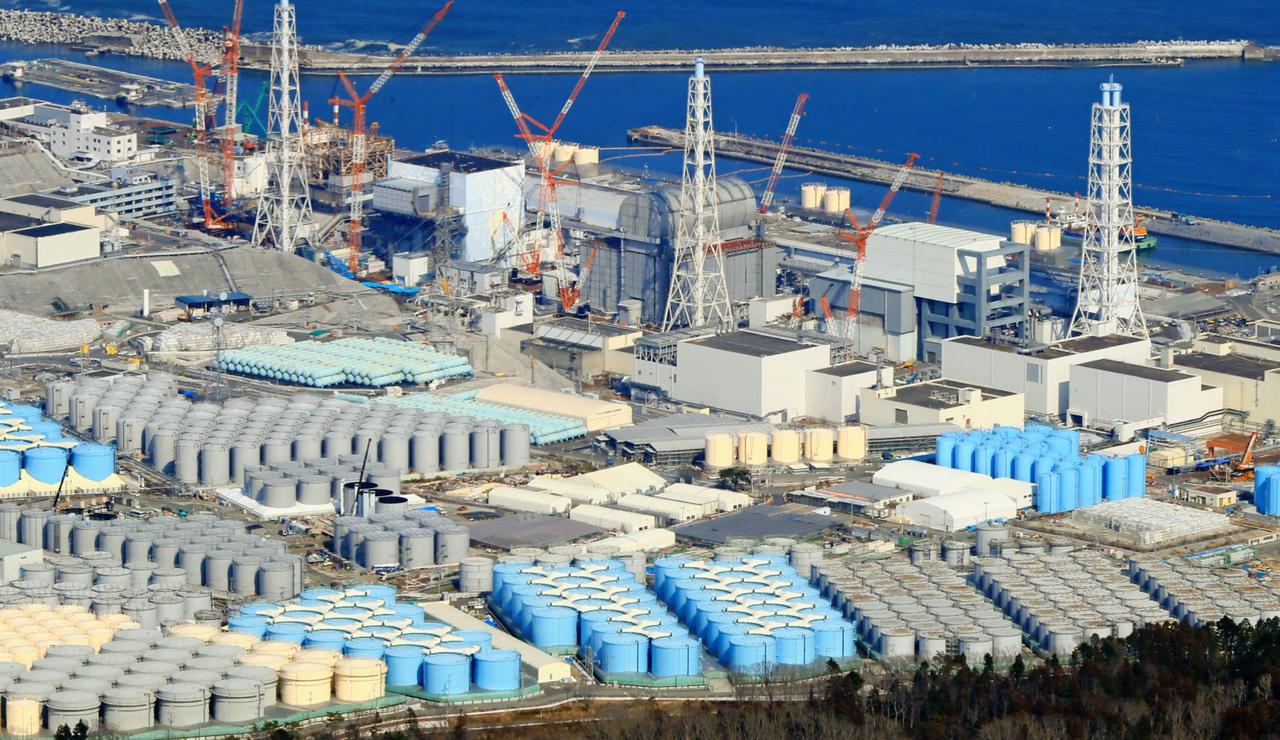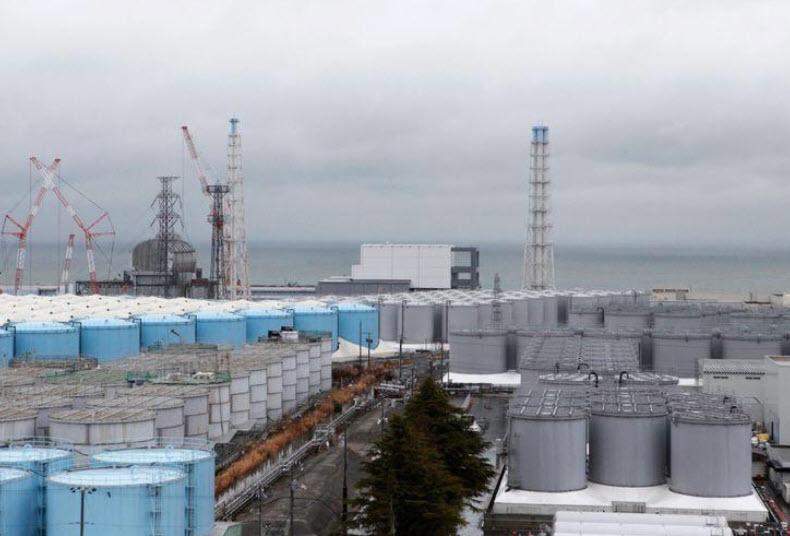Ongelofelijk
maar alweer waar: Tepco, de Japanse eigenaar van de Fukushima kerncentrale, wil toestemming van de Japanse overheid om 1,2 miljoen ton radioactief besmet water in zee te lozen (ter verduidelijking: een ton is
duizend liter en dat 1,2 miljoen maal.....)..... De centrale kampt met capaciteitsproblemen, er staan
intussen duizend grote tanks op het terrein, die bijna
allemaal zijn gevuld met radioactief besmet water.......
Eén en
ander geeft nog eens aan dat minstens 1 van de beschadigde reactoren
nog steeds niet onder controle is, immers de tanks moeten leeg voor de volgende miljoenen liters radioactief besmet water...... Dan te bedenken dat de
Japanse regering bezig is om mensen die bij het begin van deze enorme
kernramp werden geëvacueerd, te herhuisvesten in het radioactief
besmette gebied en zelfs in de buurt van de kerncentrale.......
Vergeet
niet dat al een jaar of 7 geleden voor het eerst vissen met afwijkingen door radioactieve straling van deze kerncentrale,
zelfs voor de kust van Californië werden gevangen....... De
hoeveelheid radioactief besmet water die Tepco wil lozen is zo groot dat een ramp niet
uitgesloten moet worden aldus deskundigen (trouwens daar behoef je niet deskundig voor te zijn), waar in de toekomst opnieuw lozingen van honderden miljoenen liters radioactiefbesmet water 'nodig zijn.....' (dat is niet nodig, gewoon op blijven slaan en daarbij proberen op een veilige manier het water te zuiveren, bijvoorbeeld door gecontroleerde verdamping, immers de schade die e.e.a. zal aanrichten in het zeeleven, is niet met een pen te beschrijven!!)
Lees het
volgende artikel van 'Tyler Durden, eerder gepubliceerd op Zero Hedge
en zegt het voort, zeker nu ook hier weer stemmen opgaan om de meer dan
verdoemde technologie van kernenergie in te zetten tegen de klimaatverandering....... Terwijl alleen de bouw van zo'n centrale al een enorme belasting is voor het milieu en daarmee voor het klimaat, dit nog buiten de uiterst vervuilende delving van uranium.... Voorts is kernenergie niet in een bedrag voor de kilowattuurprijs uit te drukken, zo gaan er kapitalen aan belastinggeld verloren aan subsidies voor deze enrgieopwekking en is er geen verzekeringsmaatschappij die een centrale wil verzekeren, ook dat moet via de belasting door de burger worden gedragen.... De afbraak van zo'n centrale is al helemaal niet in geld uit te drukken en te vrezen valt dat men deze centrales gewoon zal laten staan als ze totaal onveilig zijn, zoals de kerncentrale in Borssele en die in het Belgische Doel en Tihange dat nu eigenlijk al zijn....... Het probleem van radioactief afval opslag is nog steeds niet opgelost, waar het kabinet Rutte 2 dit probleem op de agenda van de Kamer gezet, niet voor over tien jaar, maar over 100 jaar...... De prijs voor gebieden die door een kernramp radioactief zijn geworden en daardoor niet meer gebruikt kunnen worden, is ook al niet in geld uit te drukken, zie Tsjernobyl en Fukushima (zoals gezegd: Japan herhuisvest schandalig genoeg bewoners die rond de laatst genoemde centrale woonden, terug in hun huis dat in radioactief besmet gebied staat....).... De Japanse autoriteiten zijn zo totaal geschift dat ze de Olympische Spelen deze zomer ook in de buurt van de Fukushima zal laten plaatsvinden.......
Japan Set To Release 1.2 Million Tons Of Radioactive Fukushima Water Into Ocean, Causing "Immeasurable Damage"
by
Tyler Durden
Sat,
02/01/2020 - 23:00
In a move that will surely prompt a furious response from Greta Thunberg's ghost writers (unless of course it doesn't fit a very narrow agenda), a panel of experts advising Japan’s government on a disposal method for the millions of tons of radioactive water from the destroyed Fukushima nuclear plant on Friday recommended releasing it into the ocean. And, as Reuters notes, based on past practice it is likely the government will accept the recommendation.
Tokyo Electric, or Tepco, has collected nearly 1.2 million tonnes of contaminated water from the cooling pipes used to keep fuel cores from melting since the plant was crippled by an earthquake and tsunami in 2011. The water is stored in huge tanks that crowd the site.

Tepco expects the wastewater storage tanks at the Fukushima Daiichi nuclear plant to run out of capacity around 2022
The panel under the industry ministry came to the conclusion after narrowing the choice to either releasing the contaminated water into the Pacific Ocean or letting it evaporate - and opted for the former, even though it means that Japan's neihgbors will now have to suffer the consequences of the biggest nuclear disaster since Chernobyl.
Previously the committee had ruled out other possibilities, such as underground storage, that lack track records of success. At the meeting, members stressed the importance of selecting proven methods and said "the government should make clear that releasing the water would have a significant social impact."
Japan's neighbor, South Korea, has for much of the past decade retained a ban on imports of seafood from Japan’s Fukushima region imposed after the nuclear disaster and summoned a senior Japanese embassy official last year to explain how the Fukushima water would be dealt with. They will soon have a very unsatisfactory answer.
The build-up of contaminated water at Fukushima has been a major sticking point in the clean-up, which is likely to last decades, especially as the Olympics are due to be held in Tokyo this summer with some events less than 60 km from the wrecked plant and the Fukushima seclusion zone which will remain uninhabitable for centuries. According to Reuters, athletes are planning to bring their own radiation detectors and food to the Games.
In 2018, the plant operator, TEPCO, apologized after admitting it lied about the cleanup efforts and that its filtration systems had not removed all dangerous material from the water - and the site was running out of room for storage tanks. Among the ludicrous proposals concocted to contain the radioactive water was an idea straight out of Game of Thrones - an underground ice wall. It did not work.
As a result, having given up on any containment approaches, Tokyo will now literally flood the world with radioactive water. Perhaps in an attempt to mitigate the angry outcry from a world that is suddenly obsessed with a clean environment, Japan said it plans to remove all radioactive particles from the water except tritium, an isotope of hydrogen that cannot be effectively removed with current technology. While it is unclear just how Japan plans on "filtering" out radiation, we with them the best of luck with that particular PR campaign.
Needless to say, even the locals disagree: releasing treated water into the ocean would do "immeasurable damage" to a fishing sector that has tried hard to get back to work, an industry source in the Fukushima Prefecture city of Iwaki said. The evaporation proposal has fueled similar worries in farming and ranching circles, according to a source in the rice-growing business.
"The central government should understand the situation on the ground" and thoroughly consider its response, the source said. Even so, it appears that despite "considereding the situation on the ground", the government is still set to go ahead with the discharge anyway.
Why? The reason may also be the simplest one - money. According to the Nikkei, discharging the water into the Pacific is generally seen by experts as the most logical option. Evaporation was successfully used for cleanup after the 1979 Three Mile Island disaster in the U.S. But releasing water into the sea would cost less and, by ministry estimates, cut radiation exposure by more than half compared with evaporation. Of course, this is the same ministry which for months lied about the full extent of the fallout caused by the Fukushima disaster. Surely this time they are telling the truth.
The recommendation needs to be confirmed by the head of the panel, Nagoya University Professor Emeritus Ichiro Yamamoto, and submitted to the government at a later date, which has not been set, but a hard deadline looms as the government is running out of time to make a decision. The roughly 1,000 tanks on the Fukushima Daiichi site held 1.18 million tons of water as of Dec. 12, not far from the total capacity of 1.37 million. Plant operator Tokyo Electric Power Co. Holdings expects to run out of space around 2022.
Even before then, the most important task in decommissioning the plant - removing spent nuclear fuel - is set to begin in 2021 at reactor No. 2. The tanks take up space that will be needed for this work.
===================================
Voor meer berichten over kernenergie, Fukushima, Tsjernobyl, Harrisburg (kerncentrale Three Mile Island) en/of Sellafield, klik op het betreffende label, direct onder dit bericht. (zie ook het schrijven over kernenergie aan de rechterkant van deze pagina)


Geen opmerkingen:
Een reactie posten